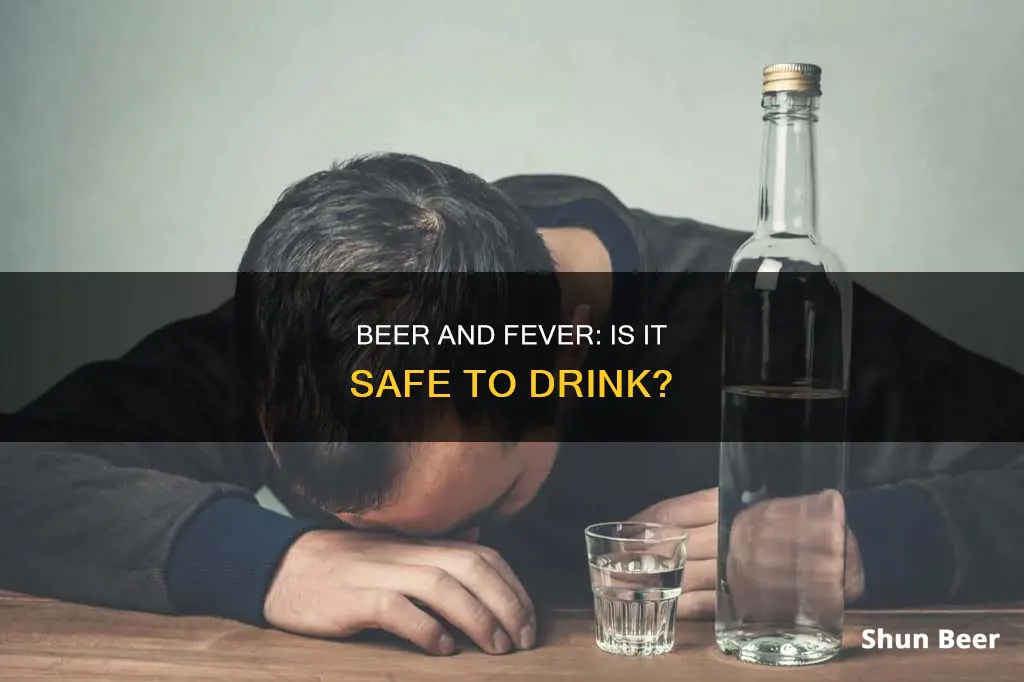
Drinking alcohol when you have a fever is generally not recommended. While moderate alcohol use may not directly induce a fever, heavy drinking can negatively affect your immune system, making you more susceptible to infections and illnesses that can cause a fever. Alcohol can also dehydrate you, making it harder for your body to regulate its temperature, which may lead to a higher body temperature or fever. In addition, alcohol can disrupt your sleep, impede your recovery, and interfere with any antibiotics you may be taking.
| Characteristics | Values |
|---|---|
| Effect on immune system | Alcohol can weaken the immune system, making it harder for the body to fight off infection. |
| Metabolism | Alcohol is metabolised by the liver and takes priority over other substances. This can slow recovery. |
| Liver function | Alcohol can cause liver abnormalities and damage liver cells. |
| Dehydration | Alcohol is a diuretic, increasing the risk of dehydration, which can worsen congestion. |
| Sleep | Alcohol can help you fall asleep faster but disrupts REM sleep, impairing the quality of rest. |
| Medication interaction | Alcohol can negatively interact with medications, including antibiotics, pain relievers, and fever reducers. |
| Congestion | Alcohol may increase nasal congestion, rather than acting as a decongestant. |
What You'll Learn

Alcohol weakens the immune system
Drinking alcohol weakens your immune system, leaving your body vulnerable to infections and increasing the chances of long-term illness. The National Institute of Alcohol Abuse and Alcoholism (NIAAA) states that even a single episode of binge drinking can leave you at a higher risk of infection for about 24 hours.
Alcohol damages the immune system by upsetting the balance of good and bad bacteria in the gut, which is essential for immune system function. It can also allow microbes to leak from the gut and interfere with liver function. Heavy drinking may also reduce immune system cells, such as white blood cells, increasing the risk of viral and bacterial infections. According to Amitava Dasgupta, a professor in the department of pathology and laboratory medicine, "Alcohol damages the ability of your immune system to fight viral infections."
The World Health Organization (WHO) has warned that alcohol consumption can compromise "the body's immune system" and increase "the risk of adverse health outcomes." This is especially true during times of lockdown or pandemic, when alcohol consumption can exacerbate health vulnerabilities, risk-taking behaviors, mental health issues, and violence.
It's important to note that moderate drinking, defined as one drink per day for women and up to two drinks per day for men, may not significantly weaken the immune system. However, excessive drinking, defined as more than three drinks in one day on most days of the week or more than five drinks on any day, can have detrimental effects on the immune system.
To maintain a strong immune system, it's recommended to engage in healthy habits such as regular physical activity, a balanced diet, and adequate sleep.
Beer and Mucinex: Safe Mix or Health Risk?
You may want to see also

Alcohol and medication don't mix
Drinking alcohol when you're sick is not a good idea. Alcohol can weaken your body's ability to fight off infection and slow down recovery. It can also dehydrate you, making congestion worse. Plus, if you're taking medication, alcohol can interact with it in dangerous ways.
Combining alcohol with certain medications can increase the risk of adverse events, including falls, driving accidents, and fatal overdoses. Alcohol can alter the way your body metabolises medication, and some medications can alter the way your body absorbs and metabolises alcohol. This can lead to higher blood alcohol concentrations and other adverse effects.
- Antibiotics: Alcohol can interfere with the metabolism of antibiotics, slowing down recovery and potentially making them ineffective.
- Pain relievers: Combining alcohol with nonsteroidal anti-inflammatory drugs (NSAIDs) such as ibuprofen, naproxen, and aspirin increases the risk of gastrointestinal bleeding. Alcohol also interacts with acetaminophen (paracetamol), a common over-the-counter pain reliever, in complex and potentially lethal ways.
- Antidepressants: Alcohol may increase the side effects of antidepressants, such as drowsiness and dizziness. It can also reduce the effectiveness of the medication and increase the risk of suicide.
- Sleep aids: Alcohol and sleep aids both have sedative effects, which can be amplified when combined. This can lead to difficulty breathing, memory problems, strange behaviour, dizziness, and impaired motor control.
- Blood pressure medications: Alcohol can react badly with blood pressure medications, causing dizziness, fainting, extreme sleepiness, and arrhythmias or other heart problems.
- Diabetes medications: Alcohol can lead to dangerously low blood sugar levels in people with diabetes and increase the risk of sudden changes in blood pressure.
- Heartburn and nausea medications: Mixing alcohol with these medications can cause a rapid heartbeat and sudden changes in blood pressure. It also increases the risk of overdose and can make the effects of alcohol stronger.
- Cholesterol medications: Combining alcohol with cholesterol medications can cause liver damage, flushing, itching, and stomach bleeding.
- Prostate medications: Alcohol can cause dizziness and fainting when combined with prostate medications.
- ADHD medications: Mixing alcohol with ADHD medications can increase the risk of overdose, as well as causing dizziness, impaired concentration, liver damage, and heart problems.
- Arthritis medications: Alcohol and arthritis medications can cause ulcers, liver damage, and stomach bleeding.
- Infection medications (antibiotics, antifungals, and antiparasitics): Combining alcohol with these medications can cause dangerous side effects such as liver damage, stomach pain, vomiting, redness of the face, a racing heartbeat, and a sudden drop in blood pressure.
- Angina and coronary heart disease medications: Isosorbide nitroglycerin, often taken for angina or coronary heart disease, can cause dizziness, fainting, rapid heartbeat, and sudden changes in blood pressure when mixed with alcohol.
It's important to note that this list is not exhaustive, and there may be other medications not listed here that can interact dangerously with alcohol. Always check with your healthcare provider before consuming alcohol while taking any medication.
Maryland Beer Laws: Drinking in Your Yard
You may want to see also

Alcohol causes dehydration
Drinking alcohol is a bad idea when you're feeling unwell. Alcohol can weaken your body's ability to fight off infection, and a weakened immune system can make your body more susceptible to getting sick and slow down recovery.
Dr Karl Kruszelnicki explains that when you drink alcohol, you urinate more than the amount of liquid you've consumed. So if you drink 200 millilitres of beer, which is about 95% water, you will still urinate about 320 millilitres of urine. That's because alcohol interferes with the mechanism that regulates water levels in our body.
The body has detectors that can sense the saltiness and volume of water in the body. When these detectors identify dehydration, they send a signal to the posterior pituitary gland, which starts pumping out the anti-diuretic hormone (ADH). ADH's job is to stop you from urinating, so you retain your precious water supply. However, alcohol does the opposite. It reduces the amount of ADH produced, so you increase how much urine you produce.
The risk of dehydration is greater in older adults and people with chronic conditions. To stay hydrated, it's important to take steps before, during, and after alcohol consumption. This includes drinking alcohol in moderation, drinking it slowly, and drinking water while consuming alcohol.
Fireball and Beer: A Safe Mix?
You may want to see also

Alcohol disrupts sleep
Alcohol is a depressant and initially acts as a sedative, helping you fall asleep faster. However, alcohol disrupts sleep in multiple ways, inhibiting overall sleep quality. Firstly, while adenosine, a sleep-inducing chemical in the brain, increases when drinking alcohol, it quickly subsides, making you more likely to wake up throughout the night. Secondly, alcohol turns on alpha activity, which indicates wakefulness with eyes closed and often precedes sleep. Experiencing alpha activity alongside slow-wave sleep patterns inhibits quality rest. Thirdly, alcohol suppresses REM sleep, the phase considered the most mentally restorative.
Finnish researchers found in a 2018 study that alcohol had significant effects on sleep quality, and that these effects were similar for men and women, as well as for younger and older adults. They found that low alcohol intake reduced sleep quality by 9.3%, moderate alcohol intake by 24%, and heavy alcohol intake by nearly 40%.
Beer After Cycling: What's the Harm?
You may want to see also

Alcohol can cause liver damage
While drinking a beer or two might be a common way to unwind and relax, it's important to remember that excessive alcohol consumption can have serious negative consequences for your health, especially your liver. Alcohol-related liver disease (ARLD) is a common condition that refers to liver damage caused by drinking too much alcohol. Here are some reasons why you should be mindful of your alcohol intake to avoid causing harm to your liver:
Alcoholic Fatty Liver Disease
Alcoholic fatty liver disease is the first stage of ARLD and can occur after just a few days of heavy drinking. It involves a build-up of fats in the liver, which can lead to an enlarged liver. While this stage may not cause any noticeable symptoms, it is a warning sign that you are drinking at a harmful level. The good news is that this condition is reversible. If you stop drinking alcohol for a few weeks to a few months, your liver should return to normal.
Alcoholic Hepatitis
Alcoholic hepatitis is a more serious condition that can develop from long-term alcohol misuse or, less commonly, from binge drinking. This is when the liver becomes inflamed, leading to permanent scarring and, in some cases, liver failure. Many people with severe alcoholic hepatitis only discover their liver damage when their condition reaches this critical stage. However, if caught early, the liver damage associated with mild alcoholic hepatitis is usually reversible with permanent abstinence from alcohol.
Cirrhosis
Cirrhosis is the most advanced stage of ARLD, where the liver has become significantly scarred. At this stage, the liver may stop functioning correctly, and there may still not be any obvious symptoms. Cirrhosis is generally not reversible, but immediate and permanent abstinence from alcohol can prevent further damage and increase your life expectancy. If you continue drinking with alcohol-related cirrhosis, your chances of living for at least five more years are less than 50%.
Complications of ARLD
ARLD can lead to several life-threatening complications, including internal bleeding, a build-up of toxins in the brain (encephalopathy), fluid accumulation in the abdomen (ascites), and increased vulnerability to infections. These complications can have severe consequences, including kidney failure and death.
Treatment and Prevention
Currently, there is no specific medical treatment for ARLD. The most effective way to prevent and treat ARLD is to stop drinking alcohol or stick to low-risk drinking guidelines. If you have fatty liver disease or mild alcoholic hepatitis, your liver may be able to recover with abstinence. However, if you have advanced ARLD, such as cirrhosis, lifelong abstinence is recommended to prevent further damage and potential liver failure. Support and treatment for alcohol dependence may be available through local alcohol support services. In severe cases, a liver transplant may be required if the liver has stopped functioning and does not improve with abstinence.
Beer and TB Treatment: Is It Safe?
You may want to see also
Frequently asked questions
No, you should not drink beer or any other alcoholic beverage when you have a fever. Alcohol can dehydrate your body, making it more difficult to regulate your temperature and even raising your body temperature further. Alcohol also impairs your immune system, which needs to be strong to fight off the infection causing your fever.
Alcohol is a diuretic, which means it causes your body to remove water and nutrients from your blood. This can lead to dehydration, which can further increase the effects of a fever.
While a small amount of alcohol might help you fall asleep faster, too much alcohol will disrupt your deep sleep, which is the key to recovery.







